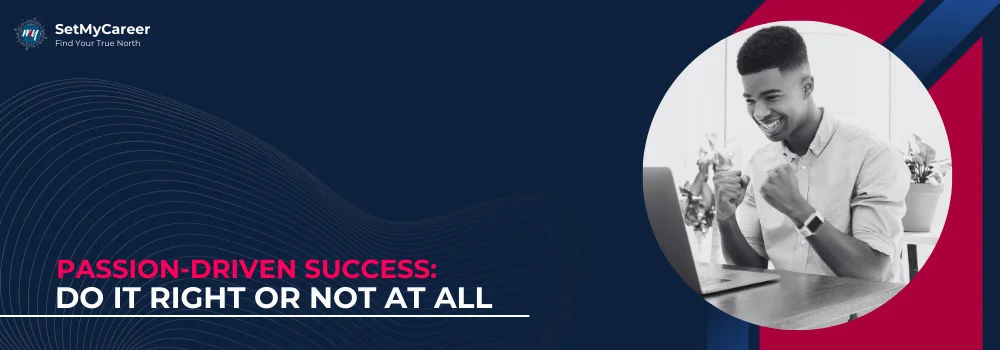
Published by Dr. Nandkishore Rathi on 10 May 2025
Chief Career Navigator
Dr. Nandkishore Rathi is passionate about identifying people's passions and helping them create and lead successful and fulfilling careers. With 30+ years of experience and interactions with thousands of students, academicians, and corporate executives, he has developed a range of career services aimed at benefiting individuals seeking a breakthrough in their professional lives.
Passion is powerful, but only if you know how to use it. Let’s learn how to do it right.

We’ve all heard the phrase “follow your passion,” usually offered as advice when someone feels stuck or uninspired. But what does that really mean when you’re choosing a career, building a business, or deciding what to do with your life? Should you take a leap of faith or play it safe? Ignore the practical and chase the dream, or sacrifice what you love for security? The truth is, passion-driven success is absolutely real, but only if you approach it with clarity, strategy, and self-awareness. If you’ve ever wondered how to pursue what lights you up without losing direction, this is the blueprint.
Passion gets romanticized all the time. It’s painted as this magical force that, once discovered, will effortlessly carry you to success. But in reality, passion isn’t just excitement, it’s deep, consistent motivation aligned with what you value most.
When you’re passionate about something, you’re naturally more focused, more curious, and more resilient. It’s that internal energy source that keeps you going, not just when things are exciting, but especially when they get tough. Psychologically, this is where your intrinsic motivation kicks in, the kind that feels fulfilling because it matters to you, not because someone else says it should.
But passion without structure doesn’t last. It has to be supported by clear thinking, consistent effort, and an understanding of where your passion fits in the bigger picture of your life.
The idea of passion can feel like something we either have or don’t have. But the truth is, passion is rarely lightning in a bottle, it often grows slowly over time, through experience, effort, and even discomfort. What looks like passion is often the result of engagement, the kind that builds when you start doing something consistently, notice your progress, and feel a sense of purpose in it.
So if you haven’t “found” your passion yet, that’s okay. You’re not behind. You’re human.
Sometimes what we think is our passion is really just a fantasy we’ve absorbed, from movies, social media, or even family expectations. It might look glamorous from the outside, but when we actually try it, it doesn't energize us or fit our natural style.
Ask yourself:
Is this something I love doing, or something I love the idea of doing?
Am I drawn to the work itself, or just the rewards or recognition that seem to come with it?
When I imagine myself in this role, am I picturing the real work or a highlight reel?
Romanticizing a dream career is normal. But being able to tell the difference between fantasy and authentic passion is what sets you up for real growth.
Even when we do find something we love, it won’t always feel exciting. Burnout, boredom, or self-doubt can creep in. That doesn’t mean your passion was fake. It means you’re human, and passion, like anything else, needs care.
Sustainable passion evolves. It makes room for breaks, pivots, and reinvention. You can:
Take a step back and explore a new angle or niche within the same field.
Reconnect with why you started, what about it lit you up in the beginning?
Talk to others in your field to gain perspective and ideas.
Career break doesn’t mean failure. It’s often the soil where your next version of passion grows.
If you want to build a meaningful and successful career around your passion, you first need to understand who you really are, what drives you, what drains you, what you value, and what you're naturally good at.
This kind of deep clarity isn’t just “nice to have”, it’s essential. But self-awareness doesn’t happen by accident. In psychology, it’s called self-concept clarity, how clearly and confidently you know your goals, values, and identity. The clearer you are, the better decisions you make.
It can be built intentionally through tools like a career psychometric test, which evaluates your personality, interests, and abilities to help you discover what types of roles, tasks, and environments match you best. It can also come through inner work, journaling, observing energy shifts, collecting feedback, and noticing patterns in what you enjoy or avoid.
The goal isn’t to fit yourself into a career, it’s to find a career that fits you. When you know your wiring, you stop guessing. You start choosing, deliberately, confidently, and with a much higher chance of long-term success.

A personalised and foolproof career strategy is the key
Plan SmartIf you’re serious about turning your passion into a long-term career path, here are key strategies to do it right:
Don’t let someone else’s definition shape your journey. Ask yourself:
What kind of lifestyle do I want?
What impact do I want to make?
What work would I be proud of, even during hard days?
Clarity is the first step toward momentum.
Every passion has layers. Whether it's music, writing, design, psychology, or science, break it down. Know your career goals, then identify smaller, specific skills you can build. Start with what’s accessible, then layer complexity as you grow.
Test your passion in real life. Volunteer, intern, freelance, or create small-scale projects. The point is to get real-world input and solid career advice. It sharpens your self-awareness and helps you pivot early if needed.
Fired from your job? Failure isn’t a sign to quit, it’s data. Every misstep teaches you something new: a weakness to strengthen, a habit to shift, or a boundary to draw. Use it. Don’t fear it.
Whether it’s a mentor, a peer group, or someone further along the path, surround yourself with people who understand the journey you’re on. The right conversations with professional networking can move you forward faster than years of trial and error.
Being realistic doesn’t mean settling. It means setting up your passion to survive and thrive. Factor in your finances, mental bandwidth, time, and long-term vision. Discipline creates freedom.
There’s a reason people feel stuck even when they’re doing what they love. Passion pursued without a foundation becomes a source of stress instead of satisfaction. That’s why it’s not about chasing passion blindly, it’s about doing it right.
And part of doing it right is knowing when to get help. Career counselling services can support you in building a practical, personalized strategy around your passion, one that takes your skills, lifestyle goals, and long-term growth into account. They can also help in choosing which course is best for future goals before you lose time or energy chasing the wrong fit.
So if you’re serious about success, don’t just run on passion. Build your roadmap. Make thoughtful moves. And yes, do it all-in, but do it smart.
Here’s a Career Strategy Checklist to help you get started:
Having a strategy doesn’t kill the dream, it gives it legs.
Passion is a powerful driver, but only when paired with clarity, self-awareness, and consistent action. Don’t leave your future to guesswork. Get curious about who you are, what you’re made for, and how you can grow into the person you’re aiming to become. Career success that’s built on passion feels different. It’s not just about what you do, it’s about who you become in the process.
No. 14/595, 1st Floor, Nanjappa Reddy Layout, Koramangala 8th Block, Bangalore 560095